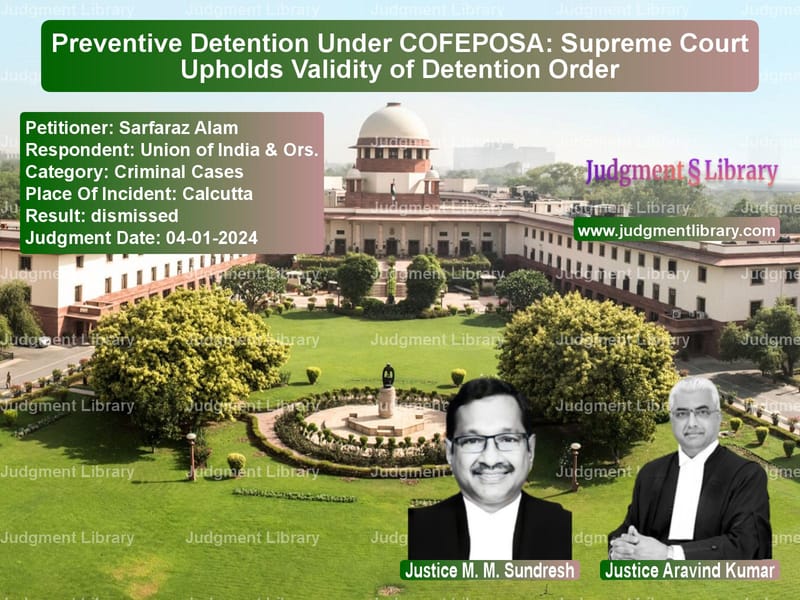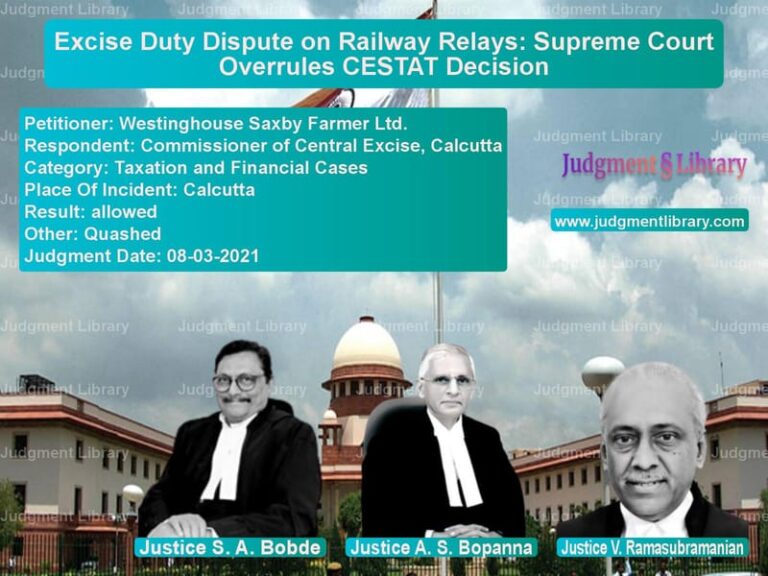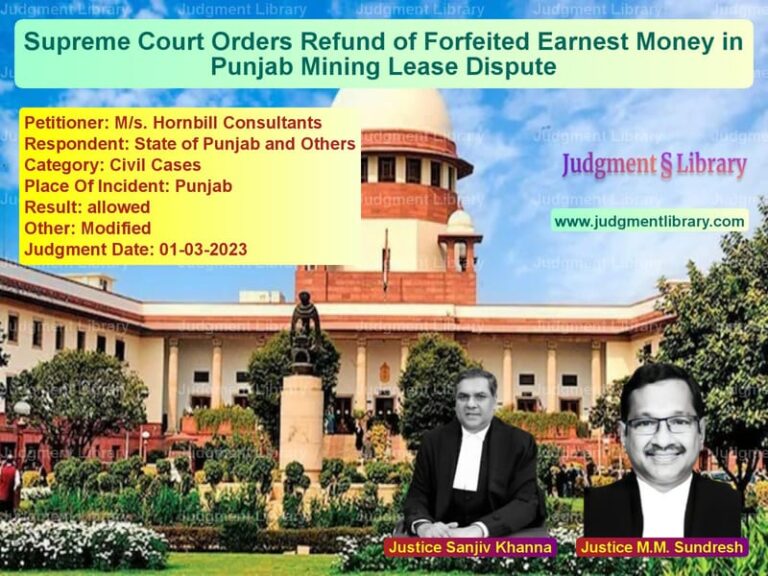Preventive Detention Under COFEPOSA: Supreme Court Upholds Validity of Detention Order
The Supreme Court of India, in its judgment dated 4 January 2024, examined the legality of a preventive detention order issued under the Conservation of Foreign Exchange and Prevention of Smuggling Activities Act, 1974 (COFEPOSA). The case, Sarfaraz Alam vs. Union of India & Ors., involved a challenge to a detention order on grounds of non-communication of rights under Article 22(5) of the Constitution.
Background of the Case
The case began when customs officials intercepted a group allegedly involved in smuggling gold and foreign currency. Based on their statements and further investigations, the authorities arrested the detenue and issued a preventive detention order on 5 September 2023 under the COFEPOSA Act. This order was executed on 19 September 2023, and the detenue was taken into custody.
The authorities attempted to serve the grounds of detention on the detenue the next day (20 September 2023) in the presence of his family members and later at the correctional facility. However, the detenue refused to accept the documents. A panchnama was prepared, and multiple further attempts were made on 3 October 2023 and finally on 10 October 2023, when the detenue accepted the documents.
The detenue’s brother-in-law, Sarfaraz Alam, filed a writ petition in the Calcutta High Court challenging the detention order on the following grounds:
- The detenue was not informed of his right to make a representation against the detention.
- All relevant materials, including recorded telephonic conversations, were not provided to the detenue.
- Since preventive detention is an exception to regular criminal law, any ambiguity should be resolved in favor of the detenue.
The High Court dismissed the petition, holding that the detenue himself had refused to receive the documents, as evidenced by the panchnama.
Petitioner’s Arguments
Before the Supreme Court, the petitioner, Sarfaraz Alam, contended:
- The detenue never refused to receive the grounds of detention.
- The authorities failed to inform the detenue about his constitutional right to make a representation.
- The grounds of detention should have been served on the detenue’s family members when he initially refused.
- There was no affidavit from the officials confirming that the detenue refused to accept the documents.
- Key evidence, including recorded conversations, was not provided to the detenue.
The petitioner relied on various Supreme Court judgments, including:
- State Legal Aid Committee, J&K vs. State of J&K (2005) 9 SCC 667
- Kamleshkumar Ishwardas Patel vs. Union of India (1995) 4 SCC 51
- Thahira Haris vs. Govt. of Karnataka (2009) 11 SCC 438
Respondent’s Arguments
The Union of India defended the detention order, arguing:
- The grounds of detention were provided in both English and Bengali.
- Multiple attempts were made to serve the documents, but the detenue refused.
- The panchnama, signed by the detenue and independent witnesses, confirmed that he refused to accept the documents.
- The detenue had adequate knowledge of English, as he signed the panchnama and wrote, “I have refused to receive any document.”
- The authorities fulfilled their duty under Article 22(5) of the Constitution by making the grounds available.
Supreme Court’s Ruling
The Supreme Court, comprising Justice M. M. Sundresh and Justice Aravind Kumar, upheld the High Court’s decision and dismissed the appeal.
Key observations of the Supreme Court:
- Article 22(5) mandates that detention grounds be served “as soon as possible” and in a language the detenue understands.
- The authorities made multiple attempts to serve the documents, but the detenue refused.
- The panchnama confirmed that the detenue read the documents and still refused to accept them.
- The detenue’s claim of not understanding English was an afterthought.
- The detenue had no absolute right to access every piece of evidence, such as telephonic conversations, in a preventive detention case.
The Court cited key precedents:
- Lallubhai Jogibhai Patel vs. Union of India (1981) 2 SCC 427
- State of Bombay vs. Atma Ram Shridhar Vaidya AIR 1951 SC 157
- Harikisan vs. State of Maharashtra AIR 1962 SC 911
The Court reiterated that preventive detention is constitutional but requires strict compliance with procedural safeguards.
Impact of the Judgment
The ruling clarifies that:
- A detenue cannot refuse documents and later claim non-communication.
- Authorities must take reasonable steps to inform the detenue of his rights, but non-acceptance does not invalidate detention.
- Preventive detention cases are distinct from criminal trials, and detenues cannot demand all evidentiary materials.
Conclusion
The Supreme Court’s decision in Sarfaraz Alam vs. Union of India strengthens the legal framework surrounding preventive detention. It underscores that authorities must follow due process, but detenues cannot exploit procedural loopholes to invalidate lawful detention orders. This ruling sets an important precedent for COFEPOSA and similar preventive detention cases in India.
Petitioner Name: Sarfaraz Alam.Respondent Name: Union of India & Ors..Judgment By: Justice M. M. Sundresh, Justice Aravind Kumar.Place Of Incident: Calcutta.Judgment Date: 04-01-2024.
Don’t miss out on the full details! Download the complete judgment in PDF format below and gain valuable insights instantly!
Download Judgment: sarfaraz-alam-vs-union-of-india-&-ors-supreme-court-of-india-judgment-dated-04-01-2024.pdf
Directly Download Judgment: Directly download this Judgment
See all petitions in Custodial Deaths and Police Misconduct
See all petitions in Bail and Anticipatory Bail
See all petitions in Fraud and Forgery
See all petitions in Legal Malpractice
See all petitions in SC/ST Act Case
See all petitions in Judgment by M.M. Sundresh
See all petitions in Judgment by Aravind Kumar
See all petitions in dismissed
See all petitions in supreme court of India judgments January 2024
See all petitions in 2024 judgments
See all posts in Criminal Cases Category
See all allowed petitions in Criminal Cases Category
See all Dismissed petitions in Criminal Cases Category
See all partially allowed petitions in Criminal Cases Category







